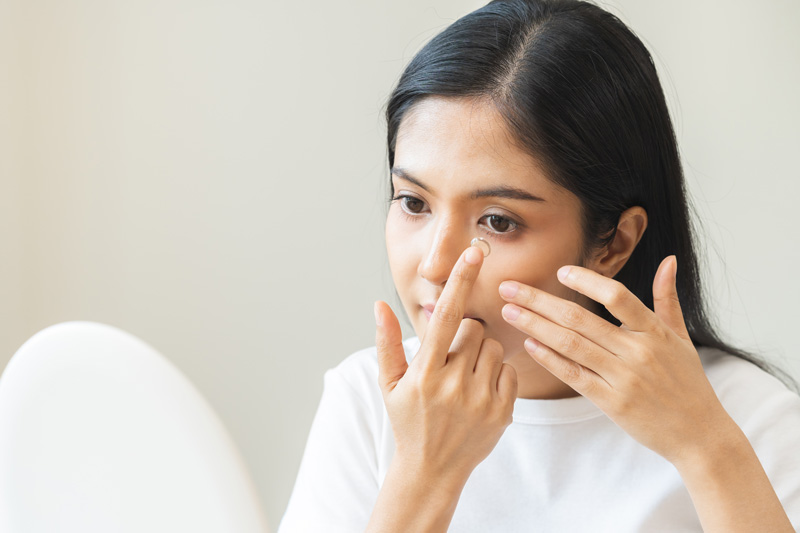Ditch Sleeping in Lenses
Sleeping in contact lenses sounds convenient, whether you’re on a bus ride and feeling a doze coming on or have simply forgotten to take them out before nodding off. However, sleeping in your contact lenses is a major no-no: not only will you wake up with dry, red, irritated, or crusty eyes, but you can also damage your eye health. Extended contact lens use can significantly reduce the amount of oxygen your eyes get, and this is enhanced during sleeping periods when your eyes are shut. This can damage the surface of your cornea, making it easier to scratch while impacting its ability to regenerate fresh cells, increasing your risk of infection.
Sleeping in contact lenses is also a first-class ticket to dry eyes. Not only will your eyes find it more difficult to fight bacteria, but they’ll be also extremely dehydrated: an uncomfortable position to be in when contact lens use can make your eyes dryer anyway! If you don’t want to deal with the upkeep managing dry eye disease takes, especially when concurrently treating an infection, skip sleeping in your lenses: you’ll be thankful you did!
Skipping Regular Lens Changes: A Recipe for Infection
If you don’t wear disposable dailies, you likely have a schedule for replacing your lenses like with bimonthly contacts. Neglecting to change your lenses as recommended can degrade lens quality, impair vision, and allow harmful buildups. Soft contact lenses are particularly prone to buildup, and switching solutions and cases doesn’t make a difference if you aren’t replacing the lenses themselves. Stick to your schedule and hygiene routine to avoid problems: it’s there for a reason.
Unwashed Hands Make Your Lenses a Bacterial Incubator
One of the first lessons of contact lenses is to always handle them with clean hands. Handling and inserting your lenses with dirty hands, even if they “look and feel clean,” transfers bacteria to your lenses which is then trapped between them and your corneas. This also dirties your solution and case, furthering the risk of infection.
Our recommendation is to always wash your hands thoroughly with a fragrance-free soap, drying with a disposable paper towel and checking for lint to ensure that you minimize the risk of irritation. Keep your cases and bottles of solution sanitized to avoid the risk of microbial cross-contamination. Poor handwashing can cause microbial keratitis and corneal inflammation, but proper hand cleansing goes a long way to minimize the risk of these. To keep the risk at a minimum, also avoid having creams and other substances on your hands like lanolin from lanolin-based soaps, while ensuring your hands are completely dry so that there is no risk of tap water transferring over.
Don’t Share Your Lenses
Sharing contact lenses with a friend or sibling who has a similar prescription may seem like a convenient thing to do, but it’s a major NO for a reason. You’re massively increasing your risk of infection every time you share. Just as touching others can spread viruses and bacteria, contact lenses can transfer infections and cause corneal irritation. This especially applies for things like costume lenses which are often sold as a fashion item.
Contact lenses also aren’t one-size-fits-all, so even if you and another person have the same eyewear prescription, even a fresh pair of your lenses may not fit them. Ill-fitting lenses can cause issues like surface scratches, dryness, and vision trouble. So don’t feel selfish for not sharing something like contact lenses: they’re just for you, for a reason!
Never Clean Your Lenses with Tap Water
Tap water may be safe to drink, but your immune system is far more adept at handling the microbes and chemicals used to treat tap water than your eyes and contact lens cases are. When you use tap water to clean your lenses, not only are you improperly cleaning them and potentially damaging their material, but you are also creating an incubator for bacteria and mold to grow in.
Only ever use contact lens-specific sterile solutions to cleanse and store your lenses. Anything else runs the risk of giving you an infection — or worse, eye-eating amoebas that can cause blindness. That’s also why you should avoid swimming and showering in your contact lenses: you don’t want any water to get trapped, and you especially don’t want to let them sit in and soak it all up!
Improper Makeup Application & Technique
Did you know that makeup can irritate your eyes? Besides ensuring that you properly remove your makeup each night, contact lens wearers can follow steps to keep their lenses and eyes in good shape. If you wear lenses and makeup, make sure to apply your eye makeup after you’ve inserted your lenses so no makeup particles get trapped underneath your lenses. It’s also a good idea to remove your lenses before you remove your eye makeup, so that any product that gets into your eyes doesn’t impact your lenses or cause them to hold the product in place by limiting tear production and forming a physical barrier. We recommend that you practice good eyelid hygiene so that your eyes can produce healthy tears in good quantities to mitigate any potential dry eye effects that can be caused when using products like mascara and eyeshadow with contacts in.
Another tip is to skip the contact lenses if you wear lash extensions and are getting them filled or applied. The glues and presence of the lens can cause your eyes to become more irritated, potentially trapping harmful gasses into the soft material of the lens itself. Lash extension wearers should also practice proper eye hygiene and sanitation to ensure that their lashes and lenses are working together, rather than against them.
Love Your Lenses
Your lenses help you see: taking care of them is simple if you incorporate healthy practices into your daily routine. Regular checkups ensure your lenses and prescription remain effective. By washing hands, adhering to schedules, and using appropriate products, you can maintain lens performance and eye health.




